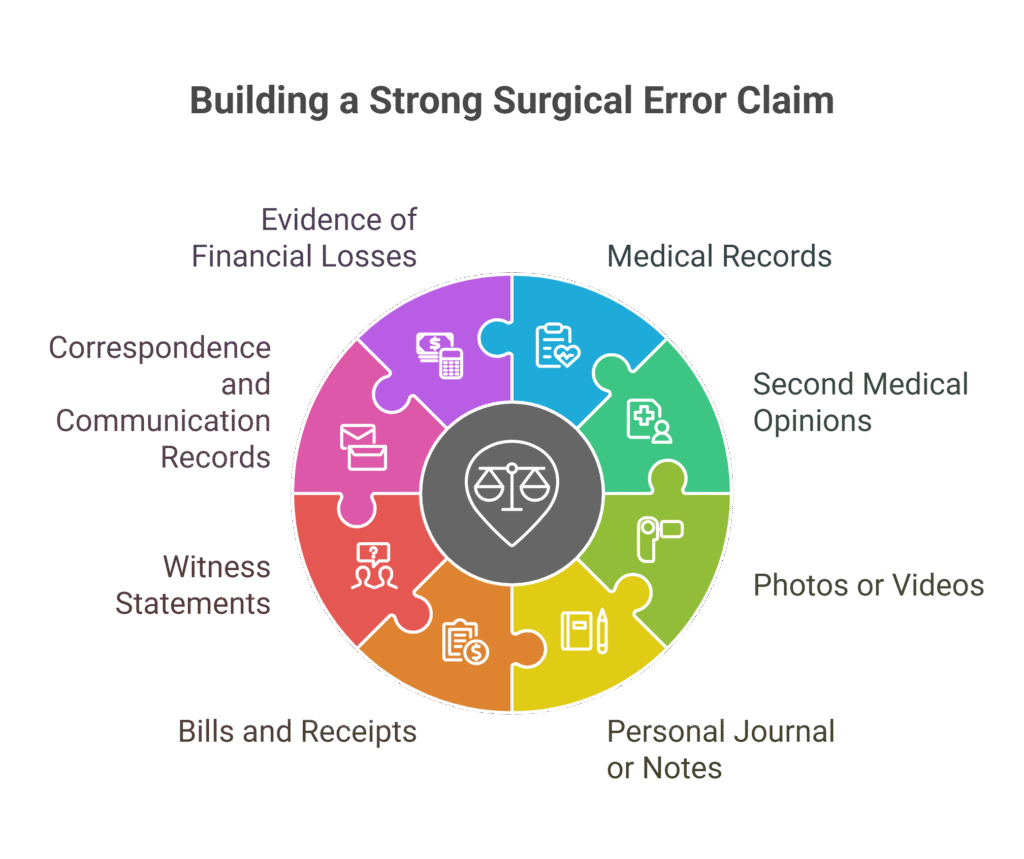
Surgery is a significant event and comes with inherent risks. However, when a surgeon or medical professional makes a preventable mistake that causes harm, you shouldn’t have to shoulder the burden alone.
Surgical errors can lead to severe complications, prolonged recovery, emotional distress, mounting medical expenses, and even loss of income, or worse, death. At Frank Spector Law, our experienced Washington D.C. surgical error lawyer is here to help.
We understand how overwhelming this situation can be and are committed to holding negligent healthcare providers accountable. If you or a loved one has been affected by a surgical error, we can guide you through your legal options and fight for the compensation you deserve.
These are just three of our significant case results we’ve secured for clients:
- $5,000,000: Awarded a $5 million settlement for injury during surgery in Baltimore.
- $3,000,000: for a child injured during surgery in Montgomery County.
- $1,000,000: A policy limit settlement in Western Maryland for surgical error.
Need a Washington D.C. surgical error lawyer? Contact us today for a free consultation and let us fight for the justice you deserve!
What is defined as a surgical error according to the law?
A surgical error is a preventable mistake that occurs during or after a surgical procedure—one that falls outside the boundaries of accepted medical practice. While not every poor outcome means malpractice occurred, surgical errors are distinct because they involve negligence or a clear deviation from the standard of care.
Examples of surgical errors include:
- Operating on the wrong site
- Leaving instruments inside a patient
- Failing to monitor for post-operative complications
These are not typical risks of surgery—they are avoidable failures that should never happen when proper protocols are followed. Our Washington D.C. surgical error lawyer can help determine whether your injury was an unfortunate complication or a legally actionable error.
Do You Have a Case?
To pursue a valid Washington D.C. medical malpractice claim, these elements must be proven:
- Duty of Care: Medical professionals are responsible for providing care that meets accepted standards. We’ll review your records to confirm this duty existed during your treatment.
- Breach of Duty: If the provider failed to meet these standards—such as leaving instruments inside the body or performing unnecessary procedures—they may have breached their duty.
- Causation: The error must have directly caused your injury. For example, complications or additional surgeries must clearly link back to the provider’s negligence.
- Damages: We must show “measurable harm”, such as medical bills, lost wages, pain, or emotional suffering. Our team gathers evidence to build your case and quantify these losses.
Damages You Can Recover
If a surgical mistake has caused harm, you shouldn’t have to face the financial and emotional burden alone. Below are the types of damages we may be entitled to pursue on your behalf:
Economic Damages
These are measurable financial losses related to the surgical error:
- Medical Expenses: Covers costs for corrective surgeries, hospital stays, medications, rehabilitation, and assistive devices.
- Lost Wages: Compensation for income lost during your recovery period.
- Reduced Earning Capacity: If your ability to work has been permanently impacted, you may recover damages for future income loss.
- Out-of-Pocket Costs: Includes expenses such as transportation for medical care, home modifications, and caregiving services.
Non-Economic Damages
These damages address the personal and emotional toll of the surgical error:
- Pain and Suffering: Compensation for the physical and emotional distress caused by the mistake.
- Loss of Enjoyment of Life: For limitations on daily activities, hobbies, or relationships.
- Disfigurement or Disability: Damages for permanent scarring, loss of mobility, or other life-altering conditions.
Loss of Consortium
If the surgical error has affected your relationship with a spouse or family member, such as a loss of companionship or support, you may be entitled to these damages.
Wrongful Death Damages
In tragic situations where a surgical error leads to a loved one’s death, surviving family members can recover compensation for funeral costs, loss of financial support, and emotional grief.
At our law firm, we are committed to helping you recover the full range of damages you deserve, ensuring those responsible are held accountable. Contact us today to learn more.
How much compensation could you claim in a surgical error case?
Compensation for a surgical error in Washington D.C. can range widely depending on the nature of the mistake, the severity of your injuries, and the long-term impact on your life.
Minor cases involving short-term complications may settle for $100,000 to $300,000, while more serious errors resulting in permanent disability, loss of income, or multiple corrective surgeries may lead to settlements or verdicts between $500,000 and $5 million or more.
Additional reading: Washington DC Erb’s Palsy Lawyer
Who Can You Hold Liable?
Building a strong medical malpractice case begins with identifying all the responsible parties. Our experienced surgical error lawyers will thoroughly examine your situation to determine who should be held accountable.
Here are the key individuals and entities that may share liability:
- Hospitals and Medical Facilities: Systemic issues, such as understaffing, poor training, or equipment failures, can make a hospital liable for errors during a surgical procedure.
- Surgeons: The surgeon performing the procedure may be directly responsible for mistakes, such as operating on the wrong body part, making improper incisions, or leaving surgical tools inside the patient.
- Nurses and Surgical Staff: Team members assisting in the surgery can be held accountable for errors like improper sterilization, mishandling equipment, or failing to follow the surgeon’s instructions.
- Anesthesiologists: Administering the wrong dosage of anesthesia, failing to monitor the patient, or not recognizing complications can lead to serious harm and liability.
- Medical Device or Equipment Manufacturers: If a defective medical device or faulty instrument was used during surgery, the manufacturer may bear responsibility for the resulting injuries.
- Other Medical Professionals: Negligence in preoperative or postoperative care—such as misdiagnosis, failure to follow up, or improper treatment—can make other healthcare providers liable.

How to Get in Touch With Our Washington D.C. Surgical Error Lawyer
The legal process we will go through on your behalf
Suing for a surgical error isn’t just about filing paperwork—it’s about building a strong, evidence-based case that can stand up to hospital systems, insurers, and medical defense teams. Our legal team handles the entire process on your behalf, from start to finish, so you can focus on recovery.
- Initial consultation and case review: We begin with a detailed conversation about what happened and review your medical records. If we determine your case has legal merit under DC law, we’ll outline your options and next steps.
- Investigation and expert analysis: We obtain operative reports, hospital records, and imaging, then work with trusted surgical experts to identify whether the standard of care was violated. This step is critical for preparing the expert certification required in DC medical malpractice cases.
- Filing your claim: Once your case is ready, we file a formal complaint in the appropriate Washington DC court. This puts the responsible parties on legal notice and starts the litigation process.
- Discovery and case building: Both sides exchange information, take depositions, and gather testimony. During this phase, we strengthen your claim with medical opinions and financial documentation to show the full extent of your losses.
- Negotiation or trial: Many DC surgical error cases are resolved through aggressive settlement negotiations. But if the other side won’t offer fair compensation, we’ll take your case to trial and present your story before a judge or jury.
Throughout each stage, our Washington D.C. surgical error attorney keeps you informed, prepared, and protected, so you can move forward with confidence.
For more clarity on these steps and how we’ll handle your case, take us up on our free consultation offer today!
Types of errors our Washington D.Cc surgical error attorneys handle
Surgical mistakes in local hospitals, outpatient centers, and private surgical practices can lead to life-altering consequences. Our attorneys have handled a wide range of cases involving preventable surgical injuries, many of which happen in some of the region’s most respected medical facilities. While we investigate every kind of surgical error, these are some of the most frequent and severe types we see:
- Wrong-site or wrong-patient surgery: Performing surgery on the incorrect body part—or the wrong patient entirely—is one of the most serious and inexcusable forms of medical error.
- Retained surgical items: Leaving surgical tools, sponges, or instruments inside a patient can cause long-term damage, infection, and often requires a second surgery to correct.
- Anesthesia mistakes: Administering the wrong dosage, failing to monitor the patient, or ignoring allergy risks can lead to cardiac arrest, brain injury, or death.
- Surgical fires and equipment failures: These rare but catastrophic incidents are nearly always avoidable and can result in severe burns, internal injuries, or long-term disability.
- Nerve damage or uncontrolled bleeding: Inattentive or rushed procedures can injure nerves or major blood vessels, leading to paralysis or life-threatening complications.
- Delayed response to surgical complications: Failure to recognize or respond quickly to signs of distress can result in preventable worsening of a patient’s condition.
- Post-surgical infections: Infections that result from improper sterilization, failure to monitor wounds, or missed symptoms can quickly become dangerous if left untreated.
- Foreign object complications: Small fragments or materials accidentally left behind can cause chronic discomfort, internal scarring, or long-term complications.
If you or a loved one experienced any of these surgical errors at a Washington D.C. medical facility, our legal team is ready to help you understand your rights and pursue compensation.
What to Do After Suspecting a Surgical Error
If you or a loved one has been harmed due to a surgical mistake, taking immediate and informed steps can protect your health and help build a strong compensation case.
Here’s what you need to do:
- Seek Immediate Medical Attention: If you’re experiencing complications, consult another medical professional promptly to address the issue and prevent further harm. A second opinion can confirm the error and guide necessary corrective treatment.
- Consult our Washington D.C. Surgical Error Attorney: Reach out to our medical malpractice lawyers for a free case review. We have the experience and resources to handle difficult medical cases and can help you seek compensation for medical expenses, pain and suffering, and any permanent injuries caused by the error.
- Request Your Medical Records: Obtain all documentation related to the medical procedure, including preoperative notes, surgical reports, and follow-up care. These records are vital for evaluating what went wrong and determining grounds for a medical malpractice lawsuit.
- Avoid Speaking With Insurance Companies: Do not discuss your case with insurance adjusters without first consulting a D.C. surgical error attorney form our law firm. Insurance companies aim to minimize payouts, and anything you say could harm your claim.
- Document Your Experience: Keep a detailed journal of your symptoms, treatments, and any additional surgery to correct the error. Photographs of physical injuries and notes from conversations with healthcare providers can be necessary evidence.
- Track Financial Losses: Maintain records of all costs related to the surgical malpractice, such as medical bills, travel expenses for ongoing medical care, and lost wages due to missed work.
- Avoid Social Media Posts: Do not share details of your condition or case online, as insurers may monitor your activity and use posts to challenge your claim.
At our law offices, we understand how overwhelming it can be to deal with errors during surgery. Our legal team is here to guide you through the process, ensuring you get the support and representation you deserve.

Be aware of these insurance company tactics
Hospitals and their insurance providers often respond quickly, but not to help you. Their goal is to limit payouts, not provide justice. If you don’t have legal representation, you may be pressured into settling for far less than your case is worth.
⚠️ Insurance companies may:
- Delay responding to your claim
- Deny that any mistake occurred
- Suggest your injury was a known complication rather than an error
Some may offer a quick settlement before you’ve had time to recover or consult with an attorney, hoping you’ll accept without knowing your full rights.
Even worse, insurers are also known to use more subtle tactics designed to undermine claims or reduce their financial exposure, such as:
- Requesting unnecessary authorizations: They may ask you to sign broad medical release forms, giving them access to years of unrelated health records. This allows them to search for preexisting conditions to blame for your injuries.
- Blaming the patient: Insurers may argue that your outcome was due to your own medical history, noncompliance with follow-up care, or a known risk—not negligence.
- Disputing causation: Even if a surgical error clearly occurred, they might claim that it didn’t directly cause your injury, especially in cases involving multiple procedures or underlying health conditions.
- Dragging out the claim process: Delays in communication, “lost” documents, or repeated requests for information are used to wear down claimants or run out the statute of limitations.
- Misrepresenting the law: Some adjusters may imply that you’re not eligible to file a claim, that the consent form protects the provider, or that a claim isn’t worth pursuing—none of which may be legally true.
- Pressuring quick settlements before full diagnosis: Offering a modest settlement early, before your full recovery or future complications are known, is a common way to close claims before full damages are understood.
✔️ Our Washington D.C. surgical error attorney handles all communication with insurers so you don’t have to. We know how to push back against these tactics, present strong medical evidence, and demand compensation that reflects the full impact of your injury. With us by your side, you won’t face the system alone—or settle for less than you deserve.
Experienced a surgical error in Washington D.C.? Contact us for your initial consultation and trusted legal support!
Time is Ticking to Start Your Claim
If a surgical error has harmed you or a loved one, it’s essential to act quickly. In Washington, D.C., the statute of limitations for filing a medical malpractice lawsuit is generally three years from the date the injury occurred or was discovered.
Waiting too long could mean losing your right to seek compensation, regardless of the severity of your case or the evidence you’ve gathered. For minors or incapacitated individuals, the timeframe may vary, but delays can still complicate the process.
Starting your personal injury claim as soon as possible gives your D.C. surgical error attorney more time to build a strong case.
Key Evidence to Gather
If you’ve experienced harm from a surgical mistake, collecting the right evidence is key for strengthening your claim. Here’s what you should gather:
- Medical Records: Obtain complete copies of your medical records, including preoperative evaluations, surgical notes, and follow-up care. These documents provide insight into what went wrong and help establish the healthcare provider’s failure to meet the standard of care.
- Second Medical Opinions: Seek a qualified medical professional to assess the impact of the surgical error. Their analysis can clarify the mistake’s consequences and serve as expert testimony to support your case.
- Photos or Videos: Capture any visible injuries, scars, or physical changes resulting from the error. Clear visual evidence can be compelling in demonstrating the harm caused.
- Personal Journal or Notes: Keep a detailed account of your symptoms, treatments, recovery process, and emotional challenges. These records help illustrate the daily toll the surgical error has had on your life.
- Bills and Receipts: Save all medical bills, therapy invoices, and other related expenses. These documents are key to calculating economic damages, such as medical costs and lost income.
- Witness Statements: If family members, caregivers, or friends have observed the effects of the surgical mistake, their testimony can provide valuable support for your claim.
- Correspondence and Communication Records: Retain any emails, text messages, or letters from your healthcare provider or their staff. These may reveal missteps, overlooked concerns, or attempts to downplay the situation.
- Evidence of Financial Losses: Include travel costs for medical appointments, home modifications, or caregiving expenses, as these can be reimbursed in your claim.
Naturally, it’s difficult to gather all of this evidence when recovering from injuries. That’s why my team and I will gather as much evidence as possible on your behalf so you don’t have to.

How Much Will Hiring Frank Spector Cost?
At Frank Spector Law, we believe that everyone deserves skilled legal representation, regardless of their financial situation. That’s why we work on a contingency fee basis—you don’t pay any legal fees unless we win compensation for you. Our payment comes as a percentage of the settlement or award you receive, so there are no upfront costs to worry about.
We understand the financial strain caused by a surgical error, from rising medical bills to lost wages. Our contingency fee model allows you to prioritize your recovery while we handle the legal process. You can trust us to fight for the justice and compensation you deserve without adding to your financial burden.
Who covers your medical costs during the case?
Surgical error cases often leave patients facing not only physical pain but also financial stress. Even with insurance, the costs of additional treatment, corrective surgery, rehabilitation, or long-term care can be overwhelming. So, who covers these expenses while your lawsuit is still in progress?
In most cases, your private health insurance, Medicare, or Medicaid may pay for some of your ongoing care. But not everything is covered—and you may still be responsible for co-pays, deductibles, or out-of-network services. If unpaid, these bills could be sent to collections or result in medical liens placed on your eventual settlement.
That’s where our legal team steps in. We help manage billing communications, coordinate with providers, and negotiate lien reductions to minimize what you owe. Our attorney works to protect your finances while your case moves forward, so you can focus on healing, not hospital bills.
Additional reading: Washington D.C. failure to diagnose lawyer
Why Choose Us Over Other Washington D.C. Surgical Error Lawyers?
If you or a loved one has suffered due to a surgical error in Washington, selecting the right attorney is vital to seeking justice and compensation for your pain. At Frank Spector Law, we understand the challenges victims of surgical errors face and are here to guide you every step of the way.
- Experience in Tough Medical Cases: With over three decades of experience, we’ve successfully handled a wide range of types of cases, including errors like operating on the wrong patient, working on the wrong side of the body, or errors made by a negligent medical team. Our background in injury law ensures you’re in capable hands.
- Tailored Legal Strategies: No two cases are alike. Whether you were injured as a result of negligence on the part of the surgical team or another form of preventable surgical mistake, we craft strategies that fit your unique circumstances and maximize your chances for recovery.
- Understanding the Medical Details: Surgical malpractice cases require detailed knowledge of both the legal and medical aspects. We work closely with medical malpractice lawyers and experts to review your medical history, analyze the error during the procedure, and prove where negligence was involved.
- Compassionate Support for Victims: We know how devastating surgical injuries can be. From physical pain to emotional trauma, the effects can be life-changing. Our team is here to support you through the process, ensuring that you feel heard and respected as we fight for the justice you deserve.
- Proven Results: Our history of helping victims of surgical malpractice speaks for itself. Whether through settlements or trials, we’ve consistently secured victim compensation and held negligent medical staff accountable.
Meet Frank Spector: Your Surgical Error Lawyer in Washington D.C.

At Frank Spector Law, I am dedicated to representing victims of medical malpractice, including surgical errors. With over 30 years of experience in complicated cases, I’ve built a strong reputation, earning recognition in Maryland Super Lawyers Magazine based on peer nominations, as well as the following accreditations:
- “Superb” rating on Avvo
- Selected to Super Lawyers: 2008 – present
- Verified Justia profile
- Verified D.C. Bar member: 1993 – current
I’ve handled diverse surgical error cases, including heart procedures like cardiac catheterizations and angiograms. One notable case involved securing a $1.3 million verdict for a family who tragically lost a loved one during a heart filter placement at Union Memorial Hospital.
Every case is unique, but my experience and commitment to justice stand out. If you’re seeking a trusted advocate for your surgical error claim, I am here to help.
Suffering from a surgical error in Washington D.C.? Start with a free initial consultation and let me help you pursue justice!
Myths vs facts about surgical errors
Many patients and families hesitate to take legal action after a surgical error because of widespread myths about medical malpractice. These misconceptions can prevent valid claims from moving forward, or lead people to accept far less than they’re entitled to. Here are some of the most common myths we hear:
Myth: “If I signed a consent form, I can’t sue.”
Fact: Consent forms explain known risks—not negligent mistakes. You still have the right to file a claim if the surgeon failed to follow proper procedures.
Myth: “Surgical errors only happen in smaller or lower-rated hospitals.”
Fact: Even top-rated medical centers in Washington DC have reported surgical errors. No facility is immune to human error or systemic breakdowns.
Myth: “If I’m recovering, I don’t have a case.”
Fact: You may still be entitled to compensation for the harm, pain, and financial loss caused—even if your condition improves over time.
Myth: “Hospitals in DC will admit their mistake if something went wrong.”
Fact: Most providers and insurers deny responsibility unless legally pressured. An experienced lawyer is often necessary to uncover the truth.
Myth: “Medical malpractice lawsuits always go to trial.”
Fact: Most surgical error cases settle outside of court. We work to resolve claims efficiently while preparing for trial if needed.
When Do Surgical Errors Become Medical Malpractice?
Not all surgical errors qualify as medical malpractice, but when a healthcare provider’s actions fail to meet the expected standard of care and result in harm, it may constitute malpractice. In Washington, D.C., surgical malpractice occurs when a surgical team’s negligence directly leads to injury or worsens a patient’s condition.
Some examples of errors made that could qualify as malpractice include:
- Performing surgery on the wrong side of the body or operating on the wrong patient.
- Leaving surgical instruments or foreign objects inside the body.
- Errors in preparation, such as failing to review the patient’s medical history, resulting in complications.
- Negligence on the part of medical staff, like improper sterilization or failure to monitor vital signs.
To prove malpractice, it must be shown that:
- The healthcare provider failed to meet the standard of care expected in their field.
- That failure directly caused harm to the patient.
- The harm resulted in measurable damages, such as surgical injuries, additional medical procedures, or financial losses.
If you suspect a preventable surgical mistake has occurred, our Washington, D.C., medical malpractice lawyers can help you evaluate your case.

A Note on Informed Consent
Before undergoing a surgical procedure, patients in Washington, D.C., are typically required to sign an informed consent form. This form outlines the risks, benefits, and potential complications associated with the surgery and offers alternatives to it. By signing it, you acknowledge that you understand these details and accept the associated risks.
However, signing an informed consent form does not mean you’ve waived your rights. If the surgical team acts negligently—such as making an avoidable mistake or failing to meet the standard of care—you may still have grounds for a medical malpractice lawsuit.
For example, malpractice may still apply if:
- A surgeon performs a procedure unrelated to your condition or one you didn’t consent to.
- The risks of the surgery were misrepresented or not fully disclosed.
- The surgeon or medical staff made an error during the procedure that wasn’t an inherent risk of the operation.
Informed consent ensures you are aware of the general risks of surgery, but it does not excuse negligence on the part of the healthcare provider. If you’ve been harmed due to a surgical error, you deserve accountability and compensation for your pain.
Main Causes of Surgical Errors That Our Surgical Error Attorney in Washington D.C. Sees
Here are some common reasons why preventable surgical mistakes occur:
- Inadequate Preoperative Planning: Failing to review the patient’s medical history or confirm critical details can result in missteps during surgery.
- Communication Failures: Miscommunication among the surgical team or between departments can lead to mistakes such as wrong-site surgery or incorrect procedures.
- Fatigue or Distraction: Long hours or lack of focus on the part of the surgeon or staff can impair judgment and lead to negligent medical care.
- Improper Training or Experience: A lack of skill or familiarity with certain procedures or equipment can increase the risk of errors.
- Defective Equipment or Instruments: Faulty tools or improperly maintained equipment can cause injuries or complications during the procedure.
Common Injuries Arising From Surgical Errors
Some of the most common injuries associated with surgical errors include:
- Infections: Poor sterilization practices or retained surgical items can lead to severe infections that require additional treatment or hospitalization.
- Internal Organ Damage: Unintentional cuts or punctures to organs during surgery can cause serious complications and may require further medical intervention.
- Nerve Damage: Mistakes made during the procedure can result in permanent loss of sensation or motor function.
- Scarring or Disfigurement: Surgical errors may lead to noticeable scars or physical deformities, affecting both appearance and quality of life.
- Chronic Pain: Some patients experience ongoing pain due to a surgical error, even after recovery.
- Anesthesia Complications: Improper administration of anesthesia can lead to brain damage, cardiovascular issues, or other serious side effects.
- Wrong-Site Surgery Injuries: Operating on the incorrect part of the body can result in unnecessary harm while leaving the original issue unaddressed.
Speak to a Wrong Site Surgery Lawyer in Washington, D.C. Today!
If you or a loved one has suffered due to a preventable surgical mistake, we understand how overwhelming and painful this experience can be.
Contact us today to schedule a free consultation. You can reach our injury lawyers by:
- Phone: Call us directly at 443-331-2686, and a member of our team will be happy to assist you.
- Online Form: Complete our easy-to-use online contact form with the details of your case, and we’ll respond promptly.
- Email: Send your inquiries to frank@frankspectorlaw.com anytime, and we’ll provide the support you need.
Are you a victim of a surgical error in Washington D.C.? Contact us today for your initial consultation and our experienced legal guidance.
